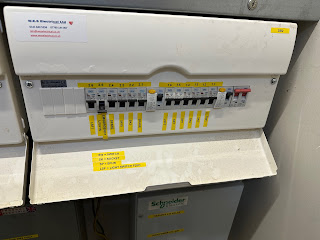A Comprehensive Guide to Landlord Certificates in Glasgow
As a landlord in Glasgow, ensuring the safety and compliance of your rental properties is not just a legal obligation but a moral one as well. With various regulations in place, it's essential to obtain the necessary certificates to safeguard your tenants and your investment. This blog provides an overview of the key landlord certificates in Glasgow, including the Electrical Installation Condition Report (EICR), Portable Appliance Testing (PAT), Legionella Risk Assessment, and Energy Performance Certificates (EPC).
Electrical Installation Condition Report (EICR Glasgow)
The Electrical Installation Condition Report (EICR) is a critical document that landlords in Glasgow must obtain to ensure the electrical installations within their properties are safe and up to standard. An EICR assesses the condition of electrical wiring, sockets, switches, and other fixed electrical equipment, identifying any potential hazards or non-compliance with current safety standards.
Why is an EICR in Glasgow Important?
- Legal Requirement: In Scotland, it is a legal requirement for landlords to have a valid EICR for their rental properties. The report must be renewed every five years or at the change of tenancy.
- Safety Assurance: An EICR ensures that the electrical installations are safe for tenants to use, minimizing the risk of electrical fires or accidents.
- Insurance Compliance: Many insurance policies for rental properties require an up-to-date EICR. Failing to comply could result in voided coverage in the event of a claim.
Portable Appliance Testing (PAT)
While the EICR covers fixed electrical installations, Portable Appliance Testing (PAT) focuses on the safety of portable electrical appliances provided by the landlord. This includes items like kettles, toasters, washing machines, and any other electrical devices supplied in the rental property.
The Role of PAT Testing
- Tenant Safety: PAT testing ensures that all portable appliances are in safe working order, reducing the risk of electrical shock or fire hazards.
- Legal Compliance: While not always a legal requirement, PAT testing is highly recommended for landlords in Glasgow to demonstrate a commitment to tenant safety.
- Regular Checks: PAT testing should be conducted annually or at the change of tenancy, especially for high-use appliances.
Legionella Risk Assessment Glasgow
Legionella bacteria, which can cause Legionnaires’ disease, can thrive in water systems if not properly maintained. As a landlord in Glasgow, you are responsible for conducting a Legionella Risk Assessment to identify and mitigate the risk of Legionella in your rental property.
Understanding Legionella Risk Assessments
- Legal Duty: Landlords are legally required to assess and control the risk of Legionella bacteria in their properties. This applies to any property with a water system, including hot and cold water tanks, pipes, and showers.
- Risk Mitigation: The assessment identifies potential risk areas and provides guidance on how to manage and reduce these risks, such as regularly flushing unused water outlets or maintaining water temperature control.
- Health and Safety: Conducting a Legionella Risk Assessment is essential to ensure the health and safety of tenants, particularly in properties with complex water systems.
Energy Performance Certificate (EPC)
An Energy Performance Certificate (EPC) is required for all rental properties in Glasgow. The EPC provides an energy efficiency rating for the property, ranging from A (most efficient) to G (least efficient), and includes recommendations for improving energy efficiency.
Importance of an EPC Glasgow
- Legal Requirement: An EPC is a legal requirement for landlords before a property can be marketed for rent. It is valid for ten years and must be made available to prospective tenants.
- Energy Efficiency: The EPC helps landlords identify ways to improve the energy efficiency of their property, potentially lowering energy bills for tenants and reducing the property’s carbon footprint.
- Attracting Tenants: Properties with higher EPC ratings are more attractive to tenants due to the potential for lower energy costs, making it a valuable asset in the competitive Glasgow rental market.
Conclusion
Staying compliant with the various landlord certificates in Glasgow is not only a legal obligation but also a key part of being a responsible landlord. The EICR, PAT testing, Legionella Risk Assessment, and EPC are all crucial documents that ensure the safety, efficiency, and legality of your rental properties.
By regularly obtaining and renewing these certificates, you can provide a safe and comfortable environment for your tenants, protect your property investment, and avoid potential legal issues. Make sure to keep these certifications up to date and consult with qualified professionals in Glasgow to assist with inspections and assessments. Your diligence in maintaining these certificates will pay off in peace of mind and a well-managed, compliant rental property.






